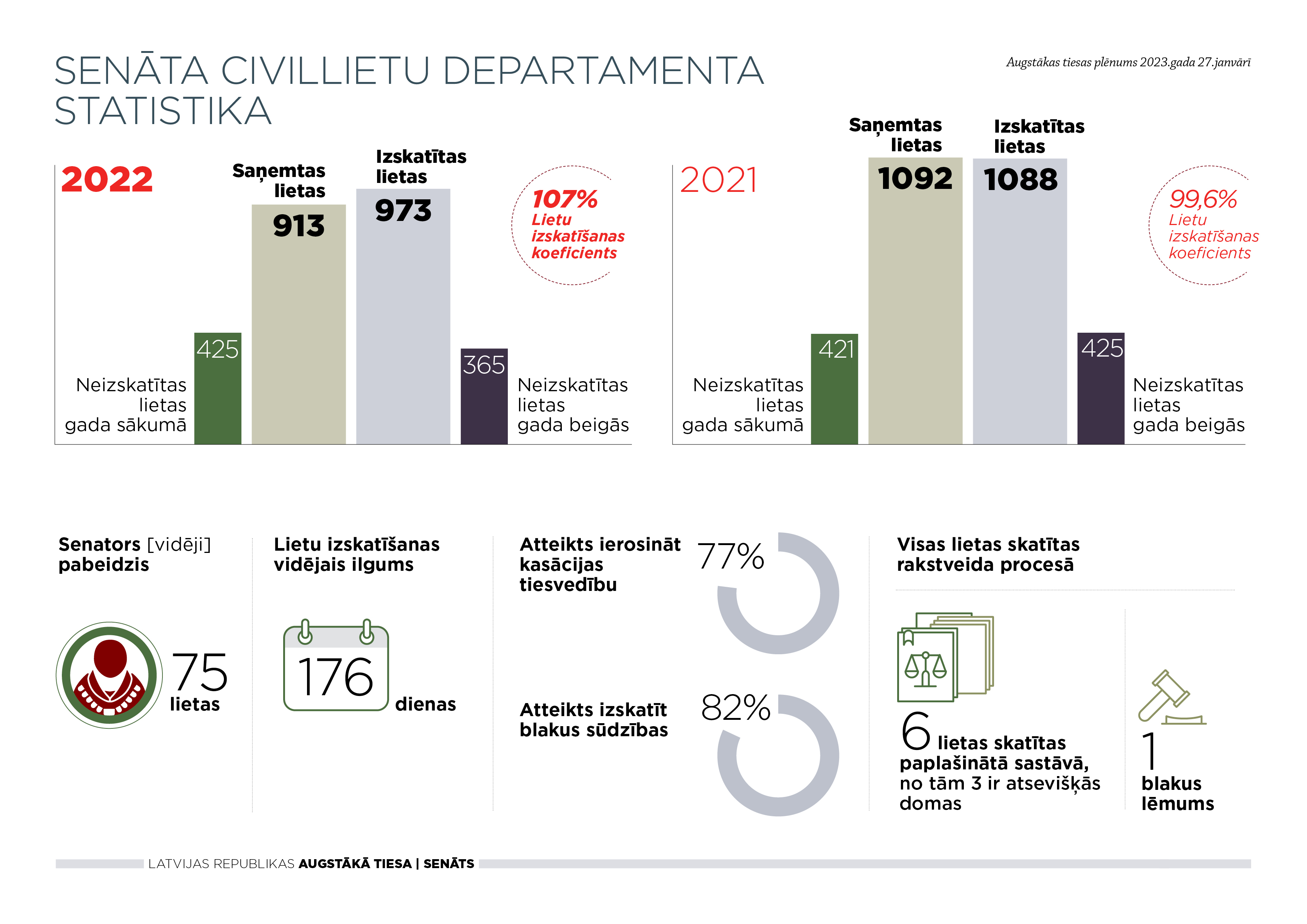30 January, 2023
The past year was a successful one for the Senate Department of Civil Cases, namely 60 more cases were examined than received and the backlog of cases was reduced to 365 cases.
Moreover, as stated by the Chair of the Department, Normunds Salenieks, in the Plenary Session of the Annual Performance Report of the Supreme Court, these results were achieved despite the fact that the Department actually worked in an incomplete composition of senators. The workload of the Department's senators averaged 75 cases per year per senator.
The efficiency of cassation proceedings filters has remained high in the Department, namely cassation proceedings had not been initiated in approximately 77% of cases. Only 12 judgements of all appealed judgements were left unchanged. What regards the ancillary complaints, this indicator is even higher, namely in 81.6% of cases legal proceedings were not initiated.
A party to proceedings had to wait an average of 119 days for the refusal to initiate cassation proceedings, the average refusal period for ancillary complaints was 52 days. Whereas, the average length of proceedings was 176 days (144 days in 2021). The Chair of the Department indicated that there were several uniform cases which it was important to resolve the issue in the extended judicial composition and this was one of the reasons for increase in the length of proceedings. For example, this applied to forced lease cases and in cases of assessing the civil liability of the building owner.
The Department has examined all cases received before 2020. Only five cases of all cases received in 2020 were pending; cassation proceedings have been initiated in all of them, and a ruling is expected in three of them at the beginning of this year.
What regards 2022 rulings of the Department, the Chair pointed out three legal issues as being relevant to the public, namely the right to compensation for non-material damages relating to death of a loved one (without putting forward the status of an heir as a prerequisite); assessment of the civil liability of the building owner in the case of the Zolitūde tragedy; as well as the assessment of harm to honour and dignity and the company's reputation in the event that a vulgar comment is made on the social network about the quality of the merchant's goods or services.
With regard to the improvement of the civil procedure, Normunds Salenieks called to consider the approximation of the regulations of the administrative procedure and the civil procedure. For example, the introduction of the institution of an invited person (amicus curiae) in the civil procedure similar to the administrative procedure and a similar regulation for the suspension of legal proceedings in connection with the appeal to the Constitutional Court. Proposals for the introduction of the mechanism of pilot cases in civil proceedings should also be developed, and discussion of such a mechanism should be encouraged in administrative proceedings and criminal proceedings as well.
This year, the Department of Civil Cases will continue teaching the methodology of civil procedure to first and second instance court judges and judge assistants, it will continue to improve the quality of cassation complaints and ancillary complaints, and it will develop cooperation between Senate departments to ensure a common understanding of legal issues.
On January 27, the Plenary Session evaluated the work of the Supreme Court in 2022. The work of the structural units was analysed by their heads, namely by chairs of Senate departments and heads of the Division of Case Law and Research and the Administration. The report was also given by the Chair of the Disciplinary Court. The Plenary Session was addressed by the Prosecutor General and the Minister of Justice.
Information prepared by
Rasma Zvejniece, the Head of the Division of Communication of the Supreme Court
E-mail: rasma.zvejniece@at.gov.lv, telephone: +371 67020396, +371 28652211


